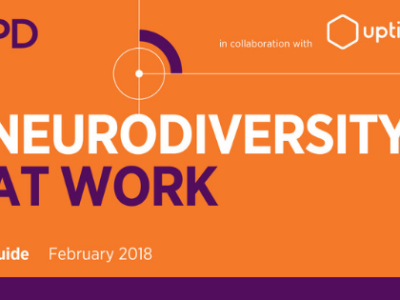In May 2019 we began our Neurodiversity At Work campaign, featuring a series of articles by guest contributors. Some articles approached the subject from a purely personal and neurodivergent perspective, others examined neurodiversity through a people profession lens.
Throughout our series, you’ll discover more about neurodiversity and the measures to take to encourage your organisation to become a more neurodiverse-friendly place.
Articles
Neurodiversity At Work – Reflections on CIPD Manchester’s campaign
Rachel and Mike reflect on the CIPD Manchester neurodiversity at work campaign (including brilliant blogs from people across the HR and L&D sectors) and draw out the key points of interest.
Embracing Neurodiversity: An insight into empowering neurodiverse employees
Neurodiversity can be a key, rather than a barrier to success, with the right support in place. Fully understanding the different neurodiverse conditions and how they may affect an individual at work, arms organisations…
Neurodiversity and Performance Management
Employers are becoming more aware of the benefits of a neurodiverse workforce and are making changes to encourage and support individuals with neurodivergent conditions. Organisations can develop processes and procedures that encourage people with…
Responding to neurodiversity amongst customers and employees
To ensure employee populations reflect the diversity of local communities we must establish a strategy of year-round inclusion, a culture-shift in thinking, serving and employing within our whole community. #NeurodiversityAtWork
How Inclusive Is Your Organisation?
Mike Shaw gives an Ignite talk on neurosdiversity at work and asks the question How inclusive is your organisation?
Strengths Not Disorders – Neurodiversity At Work
Ian Pettigrew reflects on the CIPD guide Neurodiversity at work sharing key points that resonated with him. The guide explores the strengths associated with autism, dyslexia, dyspraxia, ADHD, dyscalculia, dysgraphia, and tic disorders. Often,…
How Can We Support Neurodiversity in the Workplace?
Many employers worry that they don’t know enough about neurodiversity or that they may struggle to make adjustments to support an employee. Neurodivergence affects individuals in very different ways and covers a range of…
Understanding the benefits of neurodiversity
When businesses hire neurodivergent people, it is common for them to try to minimise the impact of the divergent thinking style; to try to “neutralise” any noticeable differences. While this often stems from the…
How to create a neurodiversity-friendly workplace
‘Neurodiversity’ is increasingly being talked about by HR professionals as part of diversity and inclusion debates. However, most employers are only beginning to appreciate the benefits of embracing neurodiversity. Jill Miller, Policy Adviser at…
Neurodiversity | Open up your mind
The CIPD Manchester Branch #NeurodiversityAtWork campaign aims to highlight the challenges for people, as well as the approaches organisations can take to be more inclusive. The campaign was inspired by the CIPD’s Neurodiversity at…
We hope you have been inspired by our #NeurodoversityAtWork campaign and we are extremely grateful to everyone who gave their time in helping us explore how we can support neurodiversity in organisations.
CIPD Resources
Neurodiversity at work
Learn more about neurodiversity, the benefits for organisations, and how to support neurodivergent people to be comfortable and successful at work
15 Feb 2018
CIPD Voice articles
Embracing neurodiversity in the workplace
Dr Jill Miller makes the case for employers to embrace neurodiversity and discusses a new CIPD guide on the issue
27 Nov 2017
Reports
Diversity and inclusion at work: facing up to the business case
Assessing the evidence on the outcomes of diversity at work, the barriers keeping inequalities in place and how organisations can tackle these to make work an equal business.
20 Jun 2018
CIPD Viewpoints
Disability at work
Explore the CIPD’s point of view on disability in the workplace, including actions for Government and recommendations for employers.
Series list
- The case for neurodiversity at work
- Open up your mind
- How to create a neurodiversity-friendly workplace
- Understanding the benefits of neurodiversity
- How can we support neurodiversity in the workplace?
- Strengths not disorders
- How inclusive is your organisation? | Ignite Talk
- Responding to neurodiversity amongst customers and employees
- Neurodiversity and Performance Management
- Key points of interest from the campaign










